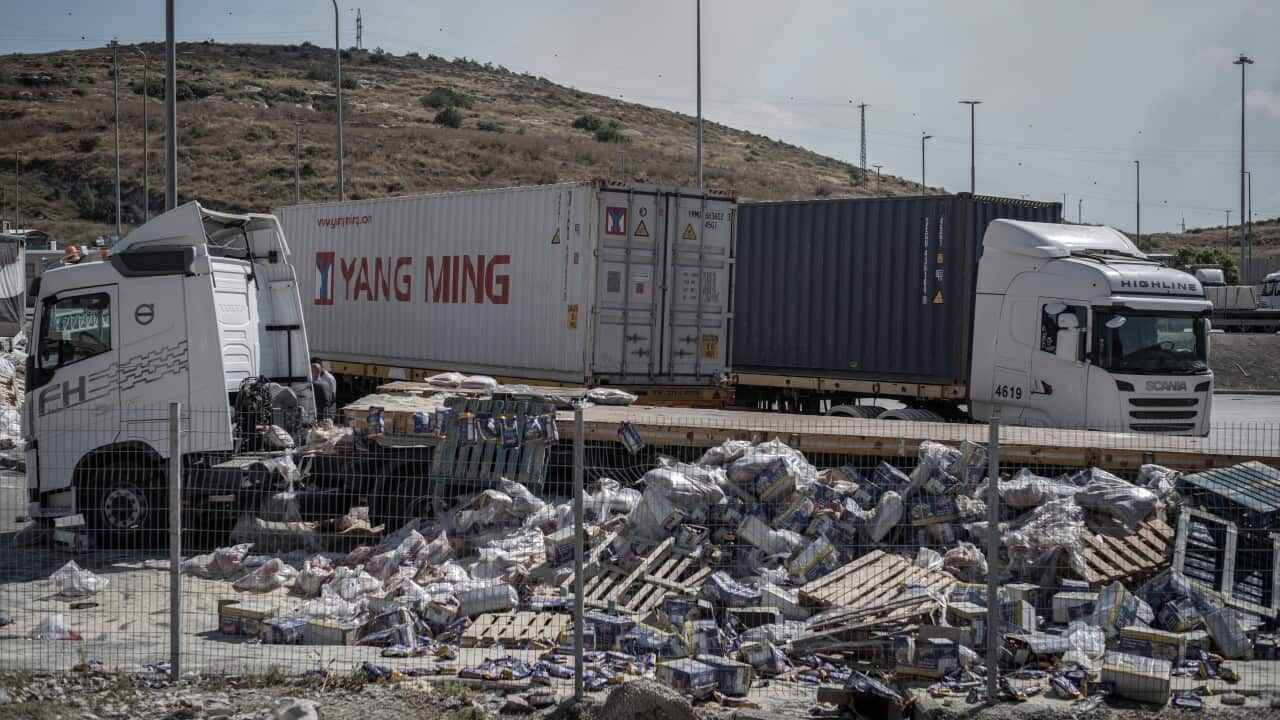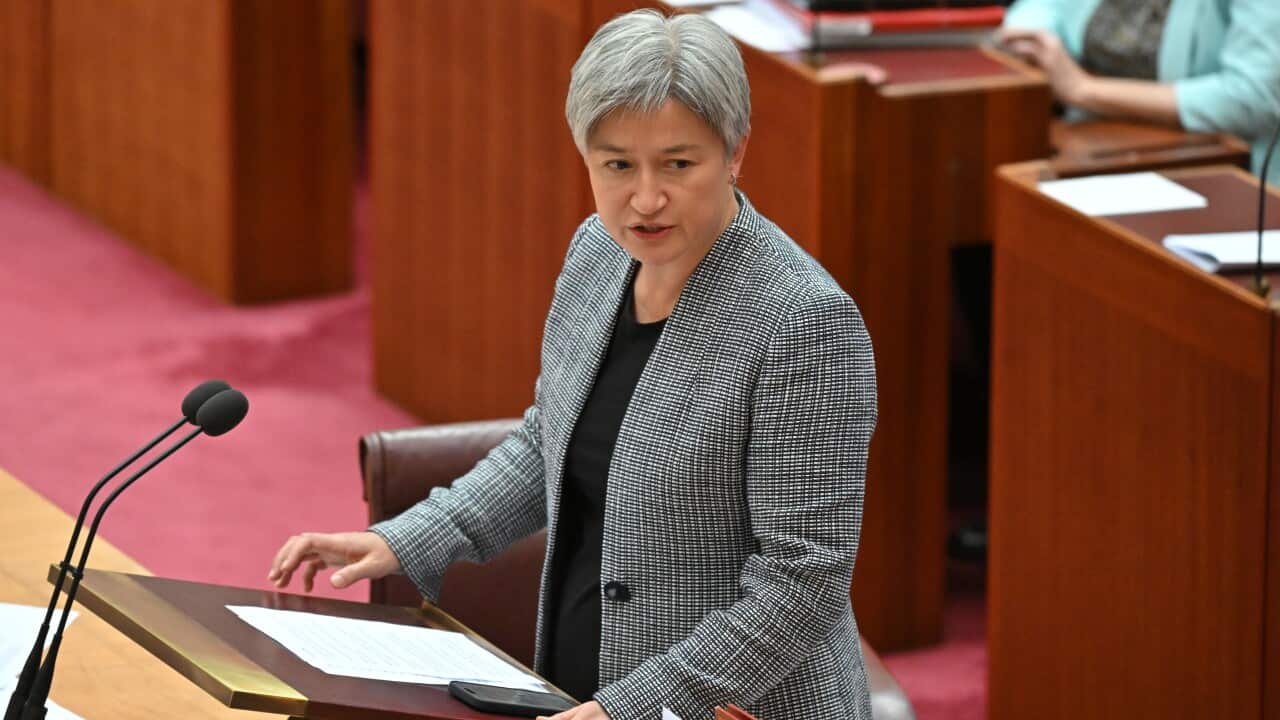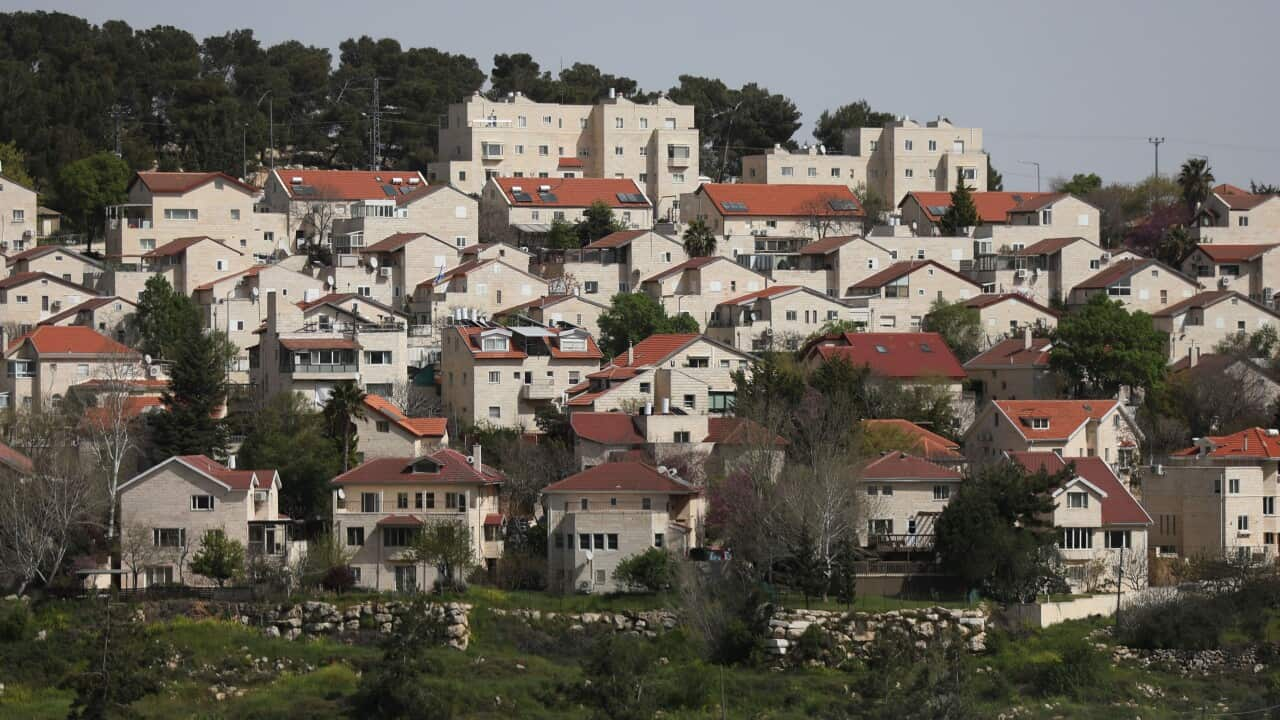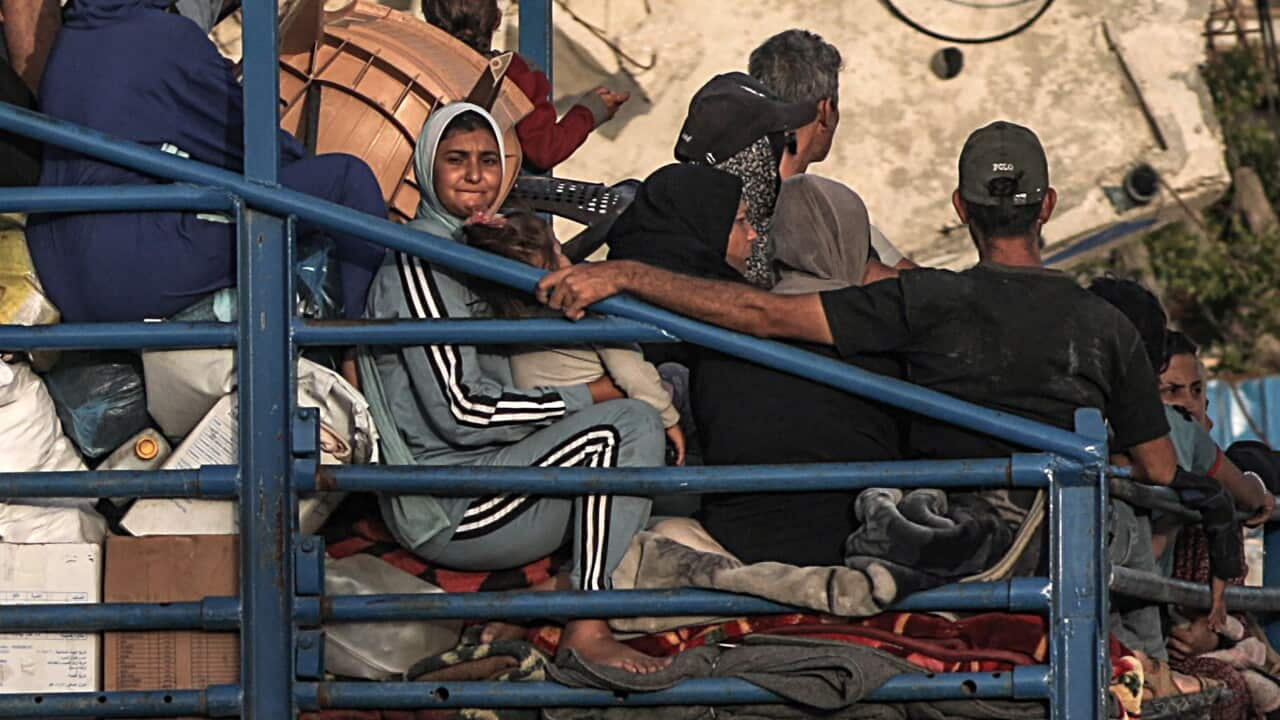The deliberate stalling or blocking of humanitarian aid bound for Gaza over months by some Israelis has culminated in an attack on an aid convoy, which left several trucks torched, goods vandalised, and resulted in four arrests.
Israeli right-wing group Tzav 9 claimed responsibility for blocking the convoy, which was heading to Gaza through the West Bank from Jordan on Monday.
Footage showed people blocking and then attacking the aid vehicles, destroying deliveries of water, food, and other aid. Later, damaged and burnt trucks could be seen left on the road.
Tzav 9 opposes aid being sent to Gaza, which the group says will end up in the hands of Hamas — the militant group that rules Gaza.

A group of Israelis destroyed humanitarian aid taken from trucks bound for Gaza at the Tarqumiya checkpoint west of Hebron on 13 May 2024. Source: SBS News / X (formerly Twitter)
That crisis has been sparked by Israel's bombardment of Gaza, which came after a 7 October attack on southern Israel where Hamas-led gunmen killed around 1,200 people and took more than 250 hostages, according to the Israeli government.
More than 35,000 Palestinians have been killed in Gaza, according to Health Ministry.
Tzav 9 declared in a statement after Monday's attack that "no aid goes through" until the remaining Israeli hostages are returned. Hamas is believed to be holding 130 hostages.
However, in a statement cited by the Jerusalem Post, the group rejected some of the more extreme elements of the attack, saying "acts were committed today that are not in line with the values of our movement".
The attack has been celebrated by other right-wing groups operating in the and Israeli territory, according to local reports.
Another incident of right-wing activists attacking trucks occurred on Wednesday night,, with items destroyed and a Palestinian driver hit in the head with a rock.
The group attacked thinking the trucks were carrying aid to Gaza, which was not the case, according to a Defence official.
International condemnation
The United States called Monday's attack "completely and utterly unacceptable behaviour".
"It is a total outrage that there are people who are attacking and looting these convoys," national security advisor Jake Sullivan said at a press conference on Monday.
"We are raising our concerns at the highest level of the Israeli government."
Vice-president of the EU Commission Josep Borrell wrote on X (formerly Twitter) that he is "outraged by the repeated and still unchecked attacks perpetrated by Israeli extremists on aid convoys on their way to Gaza".
And the United Kingdom's foreign secretary David Cameron wrote on X that Israel must hold "extremists" to account and "do more to allow aid in".
Israeli police said in a statement that an investigation into the attack was ongoing. It was not immediately clear if the four people arrested on Monday had been charged.
SBS News contacted the Israeli police with additional questions but did not receive a response by the time of publication.
What does the law say?
According to the UN, in international criminal law, "willfully impeding relief supplies" may constitute starvation of civilians as a method of warfare, which is a war crime when committed in international and non-international armed conflict.
Denial of humanitarian access to civilians and attacks against humanitarian workers are prohibited under the 4th Geneva Convention and its Additional Protocols and may amount to a crime against humanity and a war crime.
International criminal law regulates the behaviour of states, organisations, and individuals operating across boundaries in committing international crimes.
International humanitarian law applies only to armed conflict; it does not cover internal tensions or disturbances such as isolated acts of violence. The law applies only once a conflict has begun, and then equally to all sides regardless of who started the fighting according to the International Committee of the Red Cross.
The UN and humanitarian agencies have accused Israel of impeding and restricting aid getting into Gaza, a claim Israel denies.
In turn, Israel has said the issue lies with humanitarian agencies and the UN's inability to coordinate relief efforts — a claim they deny.
LISTEN TO

Fierce fighting as Israeli military returns to Jabalia refugee camp
SBS News
14/05/202404:45
While Israel has clear obligations to international law regarding the facilitation of aid into Gaza, action taken by civilians would fall under Israeli law, according to Australian National University law professor Donald Rothwell.
"Humanitarian aid damaged or destroyed by Israeli protesters, Israeli civilians … that's not a crime under international law — but it should, in principle, be a crime under Israeli law," Rothwell told SBS News, adding that it would likely fall under "property damage".
Managing director of the Global Directions Think Tank Keith Suter told SBS News that, in the context of Monday’s attack, the actions of Tzav 9 were "not really a war crime as you would normally expect it to be".
"People who were doing the blocking were carrying out a demonstration," Suter said. "They weren’t doing it with a view to starve further the people of Gaza but were complaining not enough was being done to release the hostages being held by Hamas".

In a still taken from video, damaged and burnt trucks line the road near the Tarqumiya checkpoint west of Hebron. Source: SBS News / X (formerly Twitter)
"You've got 700,000 settlers on the West Bank that represent a very important voting bloc in Israeli politics, so it makes it very difficult for any Israeli government to stand up to what’s going on," he said.
The UN considers Jewish settlements in the West Bank illegal under international law.
Rothwell echoed this point.
"I think it's a fair comment to observe that any Israeli prosecutor who was to go out and arrest and prosecute persons who might've been responsible for this conduct, there would inevitably be political consequences given the current circumstances that exist in Israel."
Israel at the Hague
With (ICJ) on Thursday and Friday, Rothwell highlighted that Monday's attack could be troublesome for the Israeli government.
The ICJ issued provisional sets of measures in January and March for Israel to take "all necessary and effective measures" to ensure necessary levels of humanitarian aid were passing into Gaza.
"At face value, the conduct that we saw on Monday is completely at variance with Israel's clear obligations," Rothwell said.
"That extends to not only the actions of the Israeli government, but the obligations of Israel to control its citizens who are creating hindrance and protest activities and damaging goods from actually crossing from Israel into Gaza."













